Do you know how much sleep you should get each night? The answer depends on your age. But if you're pulling all-nighters, waking up tired every morning, or finding it difficult to focus during the day, you're likely not getting enough sleep for optimal health. According to one source, people who are four months to one year should get between 12 and 16 hours, those between one and two should get between 11 and 14 hours, those three to five should get between 10 and 13 hours, those six to 12 should get between nine and 12 hours, those 13 to 18 should get between eight and 10 hours, and adults should get at least seven hours of sleep. And that's at least seven hours of sleep every night – not just sometimes. It's essential to be consistent. Chronic sleep deprivation can lead to a host of health complications that you’ll want to avoid. Suppose you routinely get too little sleep at night. In that case, possible issues include the following:
- Memory problems
- Mood issues
- Trouble concentrating and thinking clearly
- Accidents
- Immunity impairment
- High blood pressure
- Poor balance
- Diabetes
- Heart disease
- Weight gain
- Lower sex drive
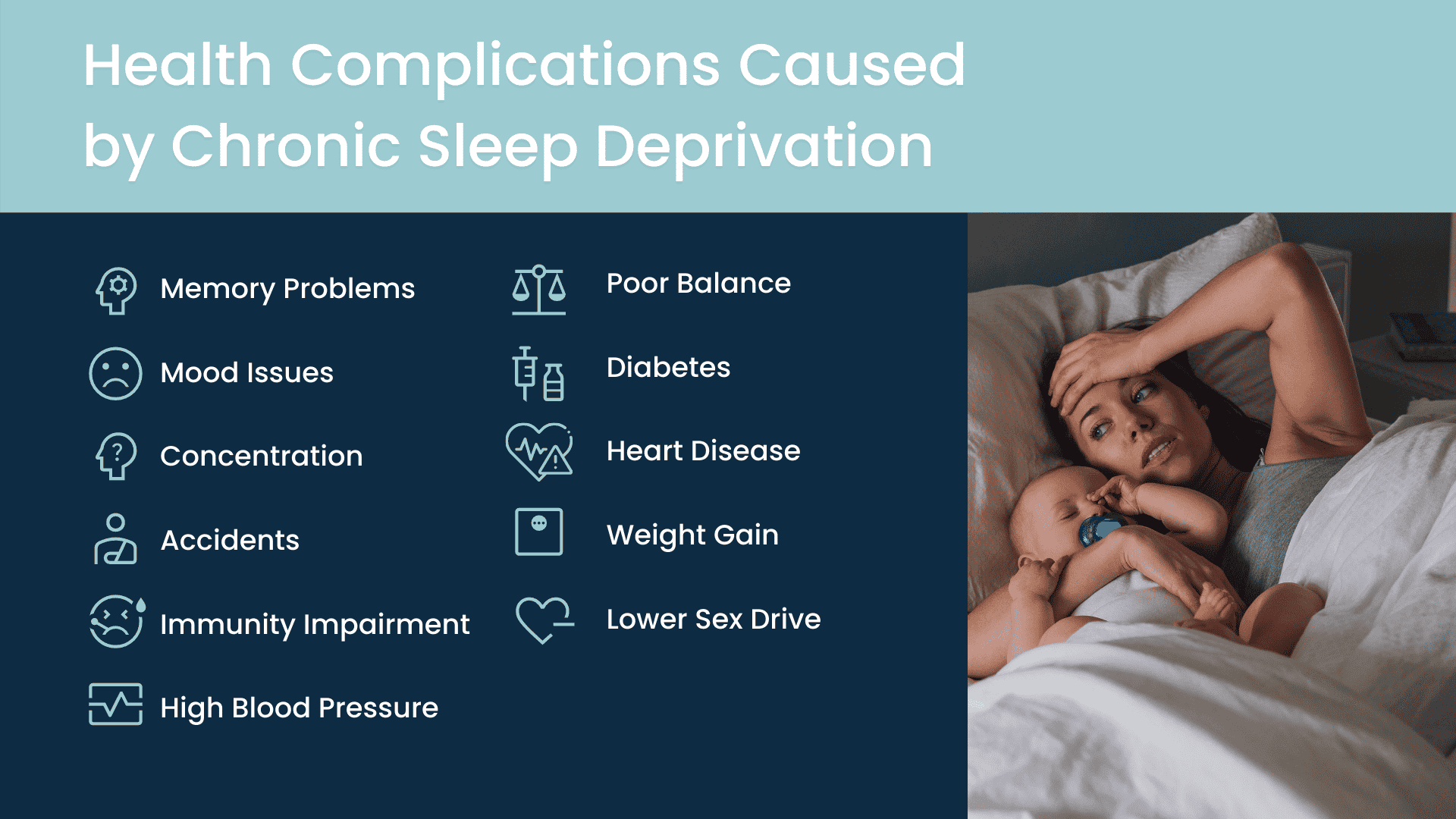 As you can no doubt see, the consequences of chronic sleep deprivation can be severe and life-altering. But how do you get a good night's rest? If you want to get sufficient sleep at night, go to bed at the same time every night – even on weekends and holidays. Steer clear of long naps in the daytime, avoid caffeinated drinks close to bedtime, stay away from excessive light from your big or small screens close to bedtime, and ensure the climate in your bedroom is ideal. Have you ever thought about the role climate plays in getting quality sleep? It pays to consider the best sleeping temperature to get the most out of your sleep time. The National Institute on Aging advises that people keep their bedrooms at a comfortable temperature. So, it shouldn't be too cold or too hot. And a previous study confirms that room temperature is a primary factor in the quality of sleep you get. But how do you know what "comfortable" is to achieve the best sleeping temperature in your bedroom? Keep reading to learn more about how to do just that.
As you can no doubt see, the consequences of chronic sleep deprivation can be severe and life-altering. But how do you get a good night's rest? If you want to get sufficient sleep at night, go to bed at the same time every night – even on weekends and holidays. Steer clear of long naps in the daytime, avoid caffeinated drinks close to bedtime, stay away from excessive light from your big or small screens close to bedtime, and ensure the climate in your bedroom is ideal. Have you ever thought about the role climate plays in getting quality sleep? It pays to consider the best sleeping temperature to get the most out of your sleep time. The National Institute on Aging advises that people keep their bedrooms at a comfortable temperature. So, it shouldn't be too cold or too hot. And a previous study confirms that room temperature is a primary factor in the quality of sleep you get. But how do you know what "comfortable" is to achieve the best sleeping temperature in your bedroom? Keep reading to learn more about how to do just that.
How Does Temperature Impact Quality of Sleep?
Your body’s circadian rhythm regulates your sleep cycle. Your normal circadian rhythm is established by a light-and-dark cycle over 24 hours. It factors into when you go to sleep and when you wake up. It can also influence essential bodily functions like body temperature, hormone release, and eating digestion and habits. Certain things can knock your circadian rhythm out of sync. They include light emitted from electronic devices at night, shift work, and changes in some genes. Various systems in your body adhere to circadian rhythms governed by a so-called master clock in your brain. Things like light significantly impact this master clock, which is why your circadian rhythm is connected to day-and-night cycles. When your circadian rhythm is in sync, it can facilitate consistent and rejuvenating rest. But problems such as insomnia are possible if your circadian rhythm is out of sync. Alterations in the circadian rhythm are usually connected to a drop in sleep quality at night. This can negatively impact daytime alertness.
What Happens If Your Bedroom Is Too Hot?
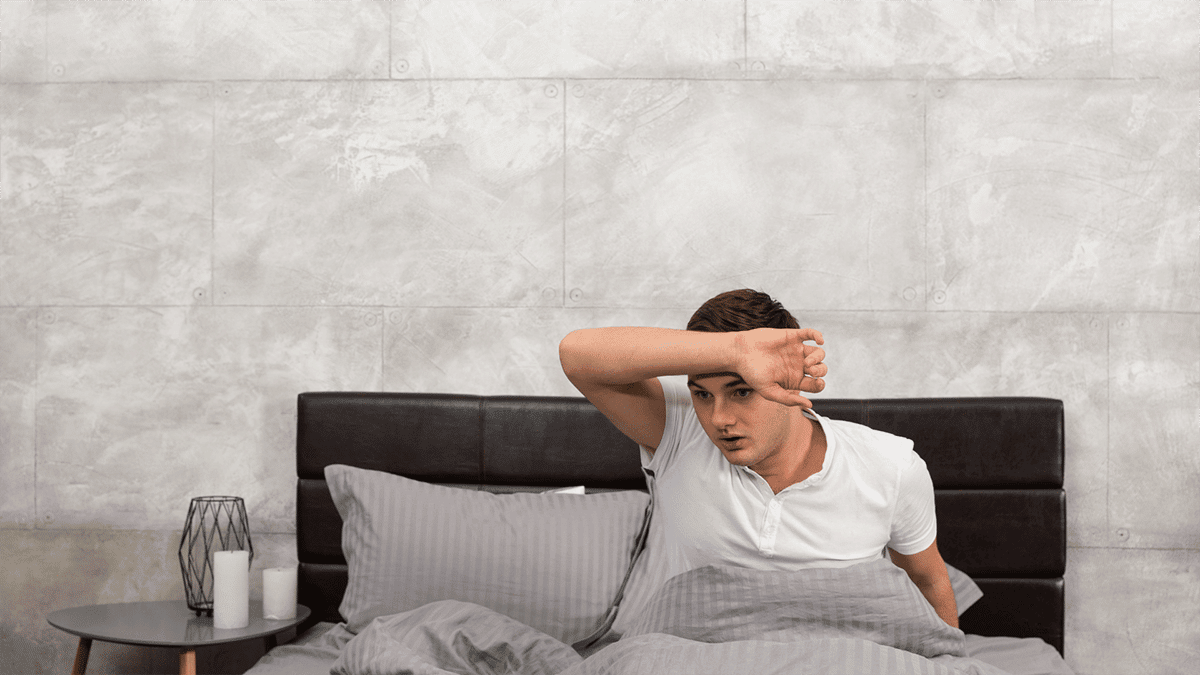 Have you ever struggled to sleep when it was scorching hot outside and muggy inside? It goes without saying that getting sufficient sleep can be challenging if your sleeping environment is sweltering or humid. If your room is too warm, you might struggle with restlessness. In fact, drifting off to sleep might seem like an impossible task. It’s important to understand that your body’s thermoregulation capacity can be thrown off if your room is too warm. While you might feel tired in such situations, you might find it hard to actually fall sleep. Your body temperature impacts how easily you can get to sleep. But it doesn’t stop there. It also factors into the amount of time you spend in various stages of sleep and the quality of the sleep you do get. In case you didn't know, the four stages of sleep are wake, light sleep, deep sleep, and rapid eye movement sleep. If you have a higher-than-optimal core body temperature, you will likely experience a lower slow-wave sleep process associated with restoration. And if there’s a significant discrepancy between your core temperature and your extremities temperature, you will likely wake up over the course of your sleep period. So, your sleep quality will be jeopardized in such circumstances.
Have you ever struggled to sleep when it was scorching hot outside and muggy inside? It goes without saying that getting sufficient sleep can be challenging if your sleeping environment is sweltering or humid. If your room is too warm, you might struggle with restlessness. In fact, drifting off to sleep might seem like an impossible task. It’s important to understand that your body’s thermoregulation capacity can be thrown off if your room is too warm. While you might feel tired in such situations, you might find it hard to actually fall sleep. Your body temperature impacts how easily you can get to sleep. But it doesn’t stop there. It also factors into the amount of time you spend in various stages of sleep and the quality of the sleep you do get. In case you didn't know, the four stages of sleep are wake, light sleep, deep sleep, and rapid eye movement sleep. If you have a higher-than-optimal core body temperature, you will likely experience a lower slow-wave sleep process associated with restoration. And if there’s a significant discrepancy between your core temperature and your extremities temperature, you will likely wake up over the course of your sleep period. So, your sleep quality will be jeopardized in such circumstances.
What Happens If Your Bedroom Is Too Cold?
A chilly bedroom won’t have as negative an impact on your sleep as a warm bedroom. But that doesn’t mean it won’t have any negative impact at all. A 2012 study focusing on semi-nude participants finds that sleep was more impacted by chilly temperatures than by warmer temperatures. In this study, the participants did not have sheets to keep warm. While a cold temperature won't usually impact your sleep cycle, it could make it harder to fall asleep. One problem with sleeping in a room that's too cold is that you might overcompensate by covering yourself with a lot of sheets, blankets, and comforters. The problem? Doing so could elevate your core temperature to the point where you might come down with a case of night sweats and even jeopardize your sleep quality. Another possible problem, if your room is too cold, is that you might experience severe muscle cramps, making for an uncomfortable night or a painful start to your day in the morning. Muscle cramps or discomfort can happen if the cold triggers spasms. Other possible problems if you sleep in a room that is too cold include trench foot, chilblains, and hypothermia. Finding the best sleeping temperature for you to avoid possible complications is best.
How to Keep Your Room Comfortably Cool?
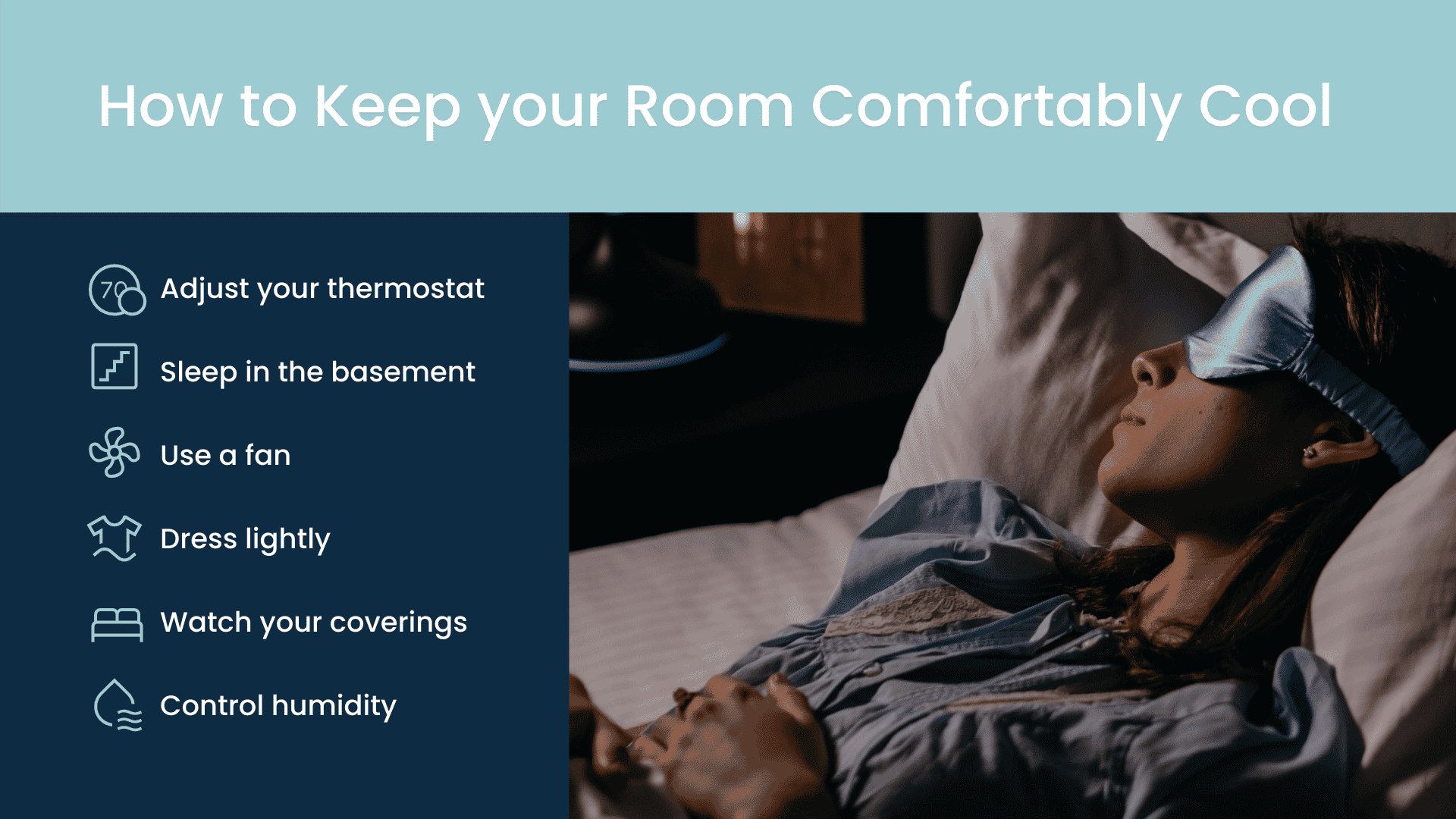 So, how should you keep your room cool enough to get a good night's sleep? Fortunately, you can do many things to achieve your objective on this front. Here are some recommendations to help you achieve the right temperature in your room.
So, how should you keep your room cool enough to get a good night's sleep? Fortunately, you can do many things to achieve your objective on this front. Here are some recommendations to help you achieve the right temperature in your room.
- Adjust your thermostat. If you have a programmable one, you can set it up so that the thermostat automatically dials up or down when desired.
- Sleep in the basement. Sleep in the basement during the warmer summer months if it's hotter upstairs than downstairs.
- Use a fan. Using a floor or ceiling fan can help keep your sleeping space cool.
- Open your window. It’s also a good idea to open your window at night to get fresh air.
- Dress lightly. If it’s especially hot, consider it when dressing for bedtime.
- Watch your coverings. You might find that putting away your blanket and using your sheet is a better idea to keep cooler at night.
- Control humidity. Get a humidifier for your bedroom and learn how to use it properly to make the space more suited to getting quality sleep at night.
What You Can Do to Prepare for Sleep?
You can also do some things to prepare your body for bedtime. Your circadian rhythm is impacted by things like exercise and diet. So, when you do these things will factor into how well you sleep during the night. In addition to preparing your sleeping space, you can do the following things to ensure you are prepared for bedtime.
- Avoid consuming caffeine or alcohol before retiring for the night.
- Go to bed at the same time each night.
- Keep your room dark at night.
- Maintain a quiet environment where you sleep.
Consider your preparation habits for bedtime and incorporate some of these tips to get the sort of rest that leaves you feeling alert and refreshed in the morning and throughout the day.
What's the Best Temperature for Sleep For Adults?
While various things factor into the quality of sleep, one of the most important is your bedroom temperature. In fact, many people aren’t even aware that climate is at least as important as getting to bed on time and sleeping in a space free of disturbances. If you’re wondering what the best sleeping temperature is for a bedroom, it’s between 60 and 67 degrees Fahrenheit. There is no one-size-fits-all answer to what the ideal bedroom temperature should be. If two people share the same room, for instance, one may find the room too warm while another might find the room too cool. Even so, keeping the temperature in the neighborhood of 65 degrees Fahrenheit should be sufficient to facilitate a good night’s rest. But, again, some may want their room to be a little warmer or a little cooler. The ideal sleeping temperature for you within that range is something you’ll figure out over time, but it’ll likely be within the given range. It’s scientifically proven that your core temperature declines in the evening hours. So, dialing down the thermostat in the evening could facilitate temperature regulation and prepare you for bed. Your body temperature will decline while you sleep, so a comfortable room will help you sleep uninterrupted throughout the night for a good night’s rest that leaves you refreshed.
What's the Best Sleep Temperature for Babies?
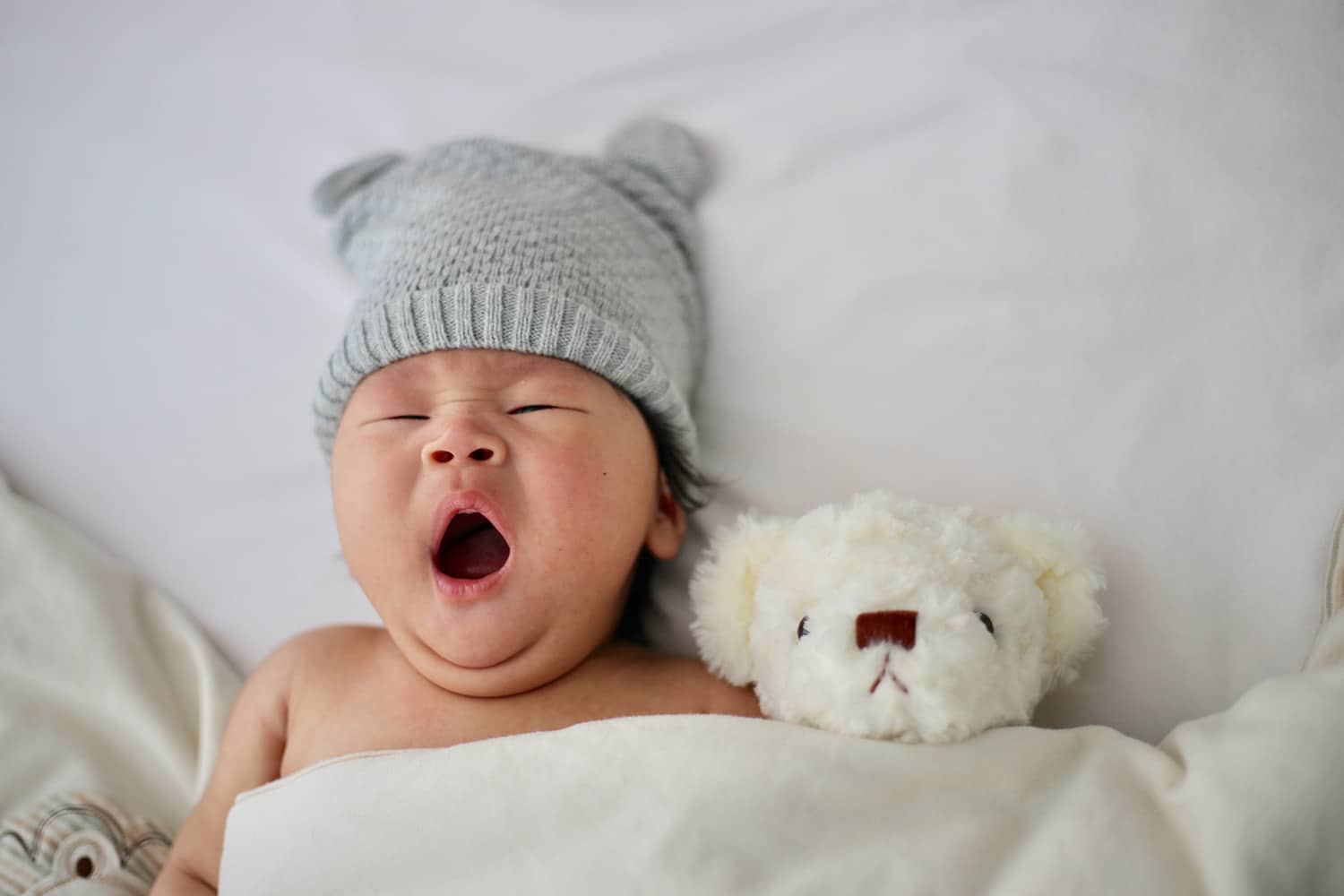 If you have a baby and want him or her to get the quality sleep needed, set the thermostat to around 69 degrees Fahrenheit. You’ll want to be especially mindful of temperature for your baby since a baby’s developing body is more sensitive to alterations in ambient temperature. Achieving the ideal temperature isn't just about making your baby comfortable. It can, unfortunately, be a matter of life and death. Overheating might increase the chances of sudden infant death syndrome in infants from one month to 12 months. Many experts believe your baby's room should be between 68 degrees Fahrenheit and 72 degrees Fahrenheit. If you want to err on the side of caution, place a thermometer in your baby's room. Also, consider using a fan or a heater, depending on the time of year. This can help to keep your infant’s resting spot comfortable year-round. In addition to taking measures to prevent overheating, there are signs to be on the lookout for, just in case. Symptoms of overheating include things like:
If you have a baby and want him or her to get the quality sleep needed, set the thermostat to around 69 degrees Fahrenheit. You’ll want to be especially mindful of temperature for your baby since a baby’s developing body is more sensitive to alterations in ambient temperature. Achieving the ideal temperature isn't just about making your baby comfortable. It can, unfortunately, be a matter of life and death. Overheating might increase the chances of sudden infant death syndrome in infants from one month to 12 months. Many experts believe your baby's room should be between 68 degrees Fahrenheit and 72 degrees Fahrenheit. If you want to err on the side of caution, place a thermometer in your baby's room. Also, consider using a fan or a heater, depending on the time of year. This can help to keep your infant’s resting spot comfortable year-round. In addition to taking measures to prevent overheating, there are signs to be on the lookout for, just in case. Symptoms of overheating include things like:
- Rapid breathing
- Flushed cheeks
- Damp hair
- Sweating
If your baby is exhibiting any of these potential signs of overheating, investigate further and adjust the temperature if necessary. It's also a good idea to avoid heavy sheets or blankets that might negate the efforts you pursue in adjusting the thermostat. Another good suggestion from the American Academy of Pediatrics is to place your baby's crib in your room for the first half year of his or her life. Doing so can lessen the risks of SIDS. You should rest better at night knowing your little one is nearby and sleeping safely. You may have to experiment to find the perfect bedroom temperature for your sleeping needs. But the benefits of getting a good night’s rest each day will make the process worthwhile. Now that you have a better grasp of not only the need for sleep, but also the importance of temperature in achieving that goal, you’ll be able to get the quality sleep you need. Different things factor into the right temperature for your sleeping space. Keep in mind these guidelines to achieve the right temperature for you
Slumber Sleep Aid Sleep Check List
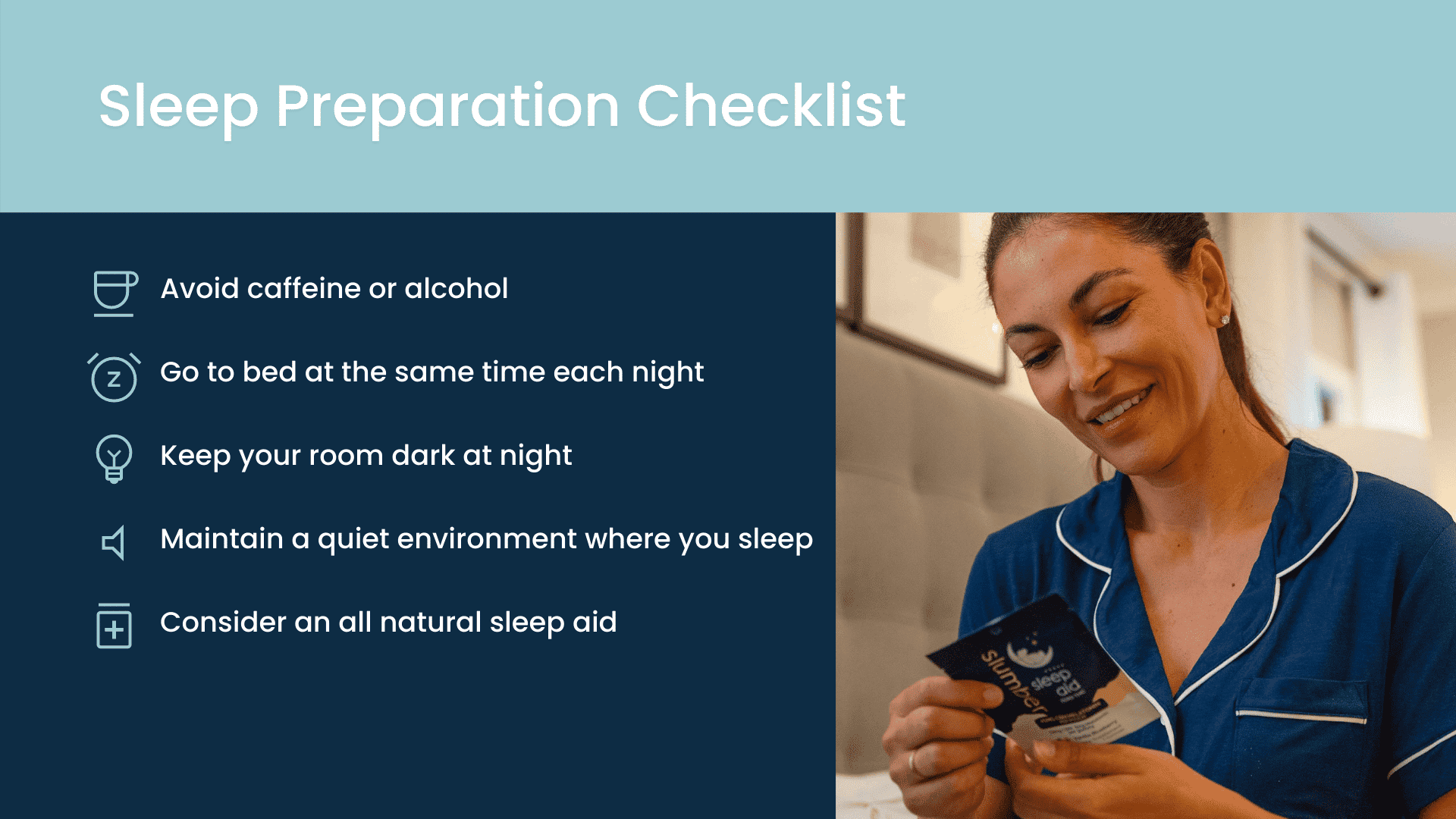 Are you looking for natural remedies to help you get a good night's rest? At Slumber, we offer plan-based sleep remedies that work. Our hemp-derived CBN will help you achieve relaxation and tranquility when you go to bed at night, which will allow you to have a better day tomorrow. Check out our official 2022 sleep study results and contact us for more information.
Are you looking for natural remedies to help you get a good night's rest? At Slumber, we offer plan-based sleep remedies that work. Our hemp-derived CBN will help you achieve relaxation and tranquility when you go to bed at night, which will allow you to have a better day tomorrow. Check out our official 2022 sleep study results and contact us for more information.


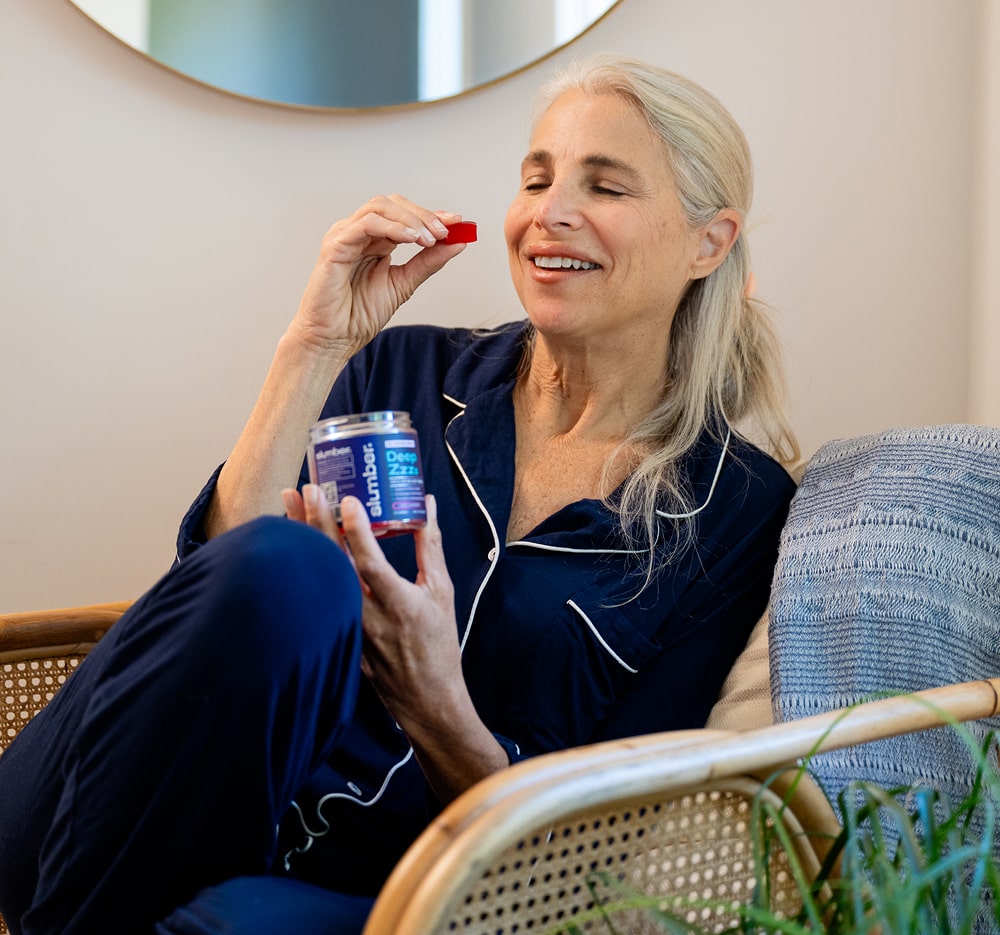
















Leave a comment
This site is protected by hCaptcha and the hCaptcha Privacy Policy and Terms of Service apply.